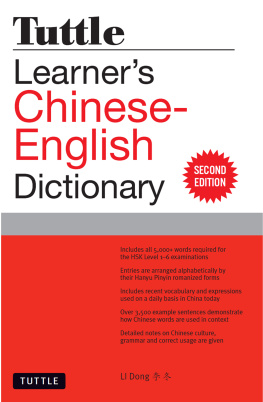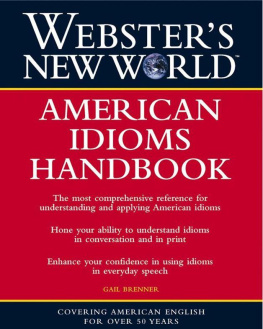500 Common Chinese Idioms
The authors have done a magnificent job explaining this important dimension in the use of Chinese. Learners will appreciate the care they have taken to ensure that the material is maximally relevant and clear. The dictionary will be an invaluable aid to both comprehension and production.
David Crystal, Honorary Professor of Linguistics, The University of Wales, UK
Grounded in corpus research, this dictionary has a number of laudable features: with focused attention on learner usage, entries are clearly analyzed, exemplified and contextualized.
Zheng-sheng Zhang, San Diego State University, USA
500 Common Chinese Idioms is the ideal tool for all intermediate to advanced learners of Chinese. Based on large corpuses of authentic language data, it presents the 500 most commonly used Chinese idioms or chngy, along with a variety of synonyms, antonyms and the most common structures, enabling the reader to make educated guesses about the meanings of hundreds of unfamiliar idioms.
Key features include:
the idiom in both simplified and traditional characters
a literal English translation and English equivalents
two suitable example sentences, plus explanations and usage notes
a pinyin index and stroke order index.
This practical dictionary is suitable both for class use and independent study and will be of interest to students and teachers of Chinese alike.
Liwei Jiao is Lecturer in Chinese at the University of Pennsylvania. His publications include The Routledge Advanced Chinese Multimedia Course: Crossing Cultural Boundaries (co-authored with Kun-shan Carolyn Lee, Hsin-Hsin Liang and Julian Wheatley, Routledge 2009).
Cornelius C. Kubler is Stanfield Professor of Asian Studies at Williams College. He has authored or co-authored nine books and over 50 articles on Chinese language pedagogy and linguistics.
Weiguo Zhang is Emeritus Professor of Chinese Linguistics at Renmin University of China. He is currently Visiting Professor and Co-director of the Confucius Institute for Ireland at University College Dublin. He has published several books on computer language.
First published 2011
by Routledge
2 Park Square, Milton Park, Abingdon, Oxon OX14 4RN
Simultaneously published in the USA and Canada
by Routledge
711 Third Avenue, New York, NY 10017
Routledge is an imprint of the Taylor & Francis Group, an informa business
2011 Liwei Jiao, Cornelius C. Kubler and Weiguo Zhang
The rights of Liwei Jiao, Cornelius C. Kubler and Weiguo Zhang to be identified as authors of this work have been asserted by them in accordance with sections 77 and 78 of the Copyright, Designs and Patents Act 1988.
Typeset in GraphSwift Light
by Graphicraft Limited, Hong Kong
All rights reserved. No part of this book may be reprinted or reproduced or utilized in any form or by any electronic, mechanical, or other means, now known or hereafter invented, including photocopying and recording, or in any information storage or retrieval system, without permission in writing from the publishers.
British Library Cataloguing in Publication Data
A catalogue record for this book is available from the British Library
Library of Congress Cataloging in Publication Data
Jiao, Liwei.
500 common Chinese idioms / Liwei Jiao, Cornelius C. Kubler, Weiguo Zhang. 1st ed.
p. cm.
Chinese languageIdiomsDictionariesEnglish. 2. Chinese language Terms and phrases. I. Kubler, Cornelius C. II. Zhang, Weiguo. III. Title. IV. Title: Five hundred common Chinese idioms.
PL1273.J53 2010
495.1313dc22
2010019805
ISBN 13: 978-0-415-59893-4 (hbk)
ISBN 13: 978-0-415-77682-0 (pbk)
ISBN 13: 978-0-203-83914-0 (ebk)
Contents
500 Common Chinese Idioms: An Annotated Frequency Dictionary is a dictionary of common Chinese idioms that is based on frequency statistics. Designed for native Englishspeaking learners of Chinese at the intermediate level or above, it is designed so that it can both serve as a reference work and also function as a supplementary textbook for either class instruction or independent learning. In addition, the dictionary can be used as a resource by teachers of Chinese as a second/foreign language for developing pedagogical materials or assessment tools.
There exist in both spoken and written Chinese a great number of idioms called ( chngy), literally set language or set expressions, which we here translate into English as idiom. These may be general in nature or they may allude to famous events or stories from Chinese history, or they may be direct quotations from famous works of Chinese literature. The great majority of Chinese idioms is composed of four characters, which usually though not always can be parsed in groups of two. Chinese idioms are usually composed in Classical Chinese and thus typically have a different grammatical structure from that of Modern Chinese. In their speech and writing, Chinese people make frequent use of idioms, since these often sum up succinctly a meaning which it would otherwise take many words to express.
Contextually appropriate use of idioms tends to impress hearers as to the educational level and eloquence of the speaker. Since idioms are frequently used in formal speech and higher-level written materials, such as newspaper editorials and commentaries, they serve as a useful medium for helping learners move up on the proficiency ladder. Familiarity with idioms can also be helpful for the nonnative in gaining credibility in Chinese society. Indeed, almost nothing impresses a Chinese person more than an aptly used idiom coming from the mouth of a foreigner.
There is a great number of idioms in Chinese, with certain dictionaries of idioms including well over 20,000 entries. All Chinese people know idioms, even though the total number known by any one individual will depend on her or his education, linguistic talent, general intelligence, etc. Idioms are such an important part of Chinese popular culture that there even exists a game called ( chngy jilng) that involves someone calling out an idiom, with someone else then being supposed to think of another idiom to link up with the first one, so that the last character of the first idiom is the same as the first character of the second idiom, and so forth. According to the Chinese search engine Baidu, the longest idiom chain ever created was all of 1,788 idioms long!
For the learner of Chinese as a second/foreign language, idioms are not so easy to understand, since the functional meaning of idioms is often different from the surface meaning and may, to quote an English idiom, be greater than the sum of its parts. This is because Chinese idioms frequently involve literary allusions, extended meanings, and metaphors. For example, take the idiom ( xu zhng sng tn). This could be translated literally as in the snow to deliver charcoal; however, the actual meaning usually has nothing at all to do with snow or charcoal, but rather involves the rendering of aid to someone at a time of need.
Similarly, it is not so easy to use idioms. For example, consider the idiom ( y sh zh xng). The literal meaning of this idiom is food, clothing, shelter, and transportation, that is, the basic necessities of life. This would seem to be not that difficult to understand. However, in speech or in written compositions, students will frequently produce a sentence such as * with the intended meaning: Everyone possesses the basic necessities of life; yet this idiom cannot be used in such a way. The basic problem here is that students understand only the general meaning of the idiom but are not clear about how to use it appropriately in their own speech or writing. And precisely because idioms are difficult to use appropriately, students tend to avoid them in their Chinese.

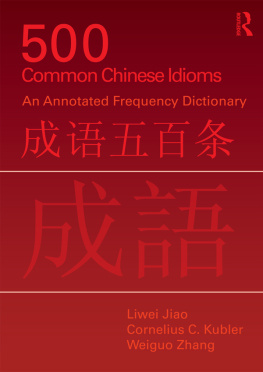

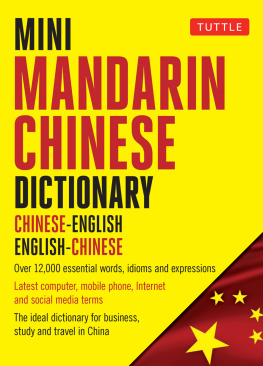
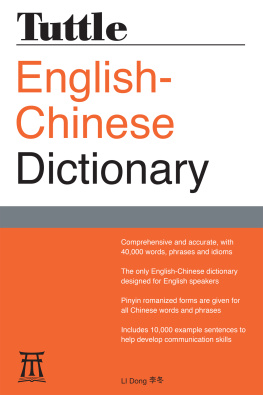
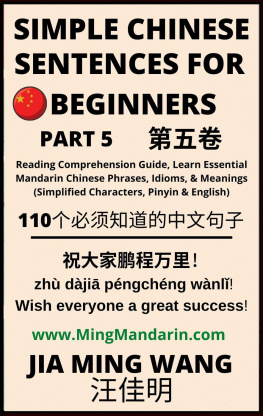
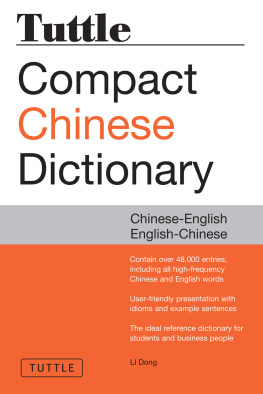
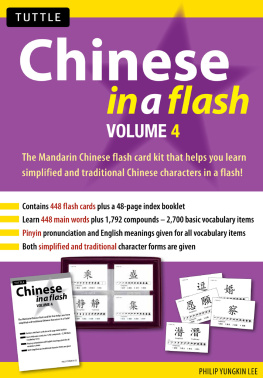
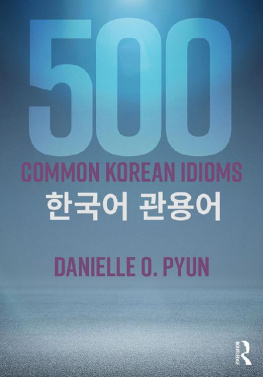
![Yi Ren - Mandarin Chinese for Beginners: Learning Conversational Chinese / Mastering Conversational Chinese [Book]](/uploads/posts/book/146887/thumbs/yi-ren-mandarin-chinese-for-beginners-learning.jpg)
